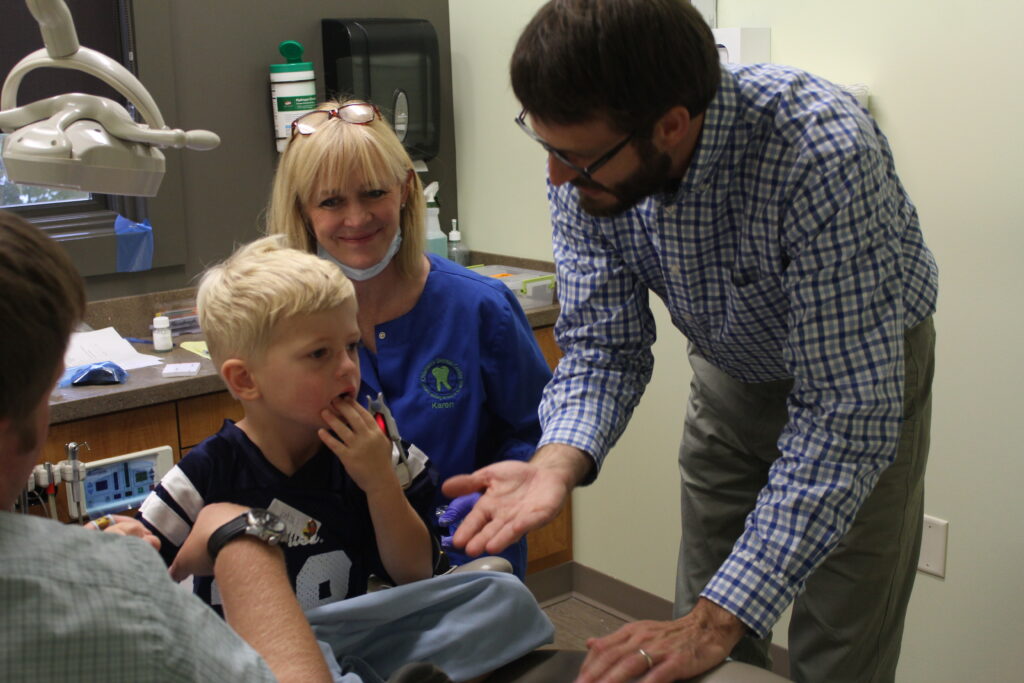Children’s Dental Center understands cavities can be a scary first experience for young children. Our team of pediatric dentists, Dr. Rowland, Dr. Selecman, Dr. Daniel, and Dr. Greene, are experts in the field and are ready to jump into action when you and your child need us most! We are here to make sure you are prepared to identify early signs your child has a cavity and how you can help prevent it.
Your child is experiencing toothaches.
The most classic sign of a cavity, toothaches are a telltale sign something is wrong with your child’s teeth. What causes the root of the pain is the irritated underlying tissues becoming exposed from contact with food or even your other teeth. Toothaches may seemingly appear out of nowhere without your child being able to pinpoint exactly when or where the issue started.
The discomfort can even spread to the jaw while chewing. If your child mentions the pain worsening during meals, certainly take note. Toothaches can be the first sign of many different issues, but if the pain lingers for a few days or continues to grow exponentially more severe, there is a good chance it is due to a cavity.
Though a common sign, it is important to remember that not all cavities will cause tooth pain and instead show their presence through other symptoms.
They are suffering from temperature and/or sugar sensitivity.
Similar to a toothache, pain from temperature or sugar sensitivity can be another sign your child is suffering from a cavity. Typically caused by worn-down enamel (the outer protective layer of a tooth), the tooth loses this barrier, and the layer of tissue called dentin underneath becomes exposed.
Enamel creates an impenetrable barrier, whereas dentin has microscopic holes allowing food or liquids to seep in. When the nerves are overstimulated, and particles of food seep in, the exposed surface is what leaves your child’s tooth sensitive and at risk for cavities.
Excessive sugar intake
Another common sign of cavities is pain in the mouth, which an unhealthy or constant amount of sugar consumption can cause. When broken down, oral bacteria are able to feed off of sugar, which, in turn, produces acid. Excessive acid can lead to your child’s tooth enamel breaking down. Continued exposure puts teeth at risk as bacteria are allowed to both damage and fester the surrounding area.
They have holes in their tooth.
Occasionally appearing as chips or cracks, this visual sign of cavities is an easy way to tell that something is amiss with your child’s oral health. The first phase usually shows itself in the form of little white dots on the tooth’s surface. If they are not noticed right away, they begin to turn dark and take the form of a hole or pit. Holes are commonly known to appear on top of the tooth, but it is possible for them to appear on the side as well.
Cavities commonly can develop in between teeth, hiding the pits from plain sight. Luckily, the pits that are not easily visible will show up on our x-rays. Should decay continue to progress without a check-up, the pain will continue to worsen and could even lead to tooth loss. In this instance, it is important to schedule an appointment with one of our pediatric dentists so we can keep an eye out for any issues.

They have discoloration affecting their tooth.
While some staining on your child’s teeth may come as a result of eating and drinking habits (coffee, tea, dark foods, etc.), they can take the form of small white dots when the symptom of a cavity. It is very important for parents to keep an eye on these symptoms once they show themselves.
If the white dot begins to darken into shades of brown or black, that means tooth decay is most likely present and spreading deeper into your child’s tooth. They may not complain of any pain at the moment, but it is crucial you call our office if it continues worsening. If left untreated, their whole tooth will eventually turn dark, thus necessitating more complex procedures.
Protect your child from cavities.
Teach your child the significance of good dental hygiene.
Educating your child on the importance of regular dental hygiene at an early age can help to instill positive routines and beliefs. The simple step of brushing and flossing in the morning and at night can do wonders for your child’s oral health. In doing so, your child is able to rid their mouth of bad bacteria plaque buildup and protect their teeth from potential cavities.
Encourage drinking water throughout the day.
Especially after meals, regularly drinking water allows your child to flush through small food particles, defend against damaging acid, and help preserve good breath. Just like practicing oral hygiene, this simple resource is able to help teeth properly function and maintain their overall strength for a longer period of time.
Sugary foods in moderation are key.
Indulging your child in a sugary treat every now and then is great, but limiting excessive intake is very important. Critical to cavity and tooth decay prevention, helping your child find healthy alternatives for their sugary favorites can help make a difference in their oral health. By promoting a balanced diet, they can receive the daily nutrition they need while even finding new foods they may come to love!

Support Your Child’s Oral Health Today!
Your child’s cavities can take shape when you least expect them. Attending your child’s biannual dentist checkups is vital so that we can help monitor their oral health and diagnose issues such as cavities early. If you are unsure of a symptom or need to get your child’s teeth checked out, don’t hesitate to schedule an appointment at our Collierville, Midtown, or Arlington practices today by calling 901-245-1900. Children’s Dental Center is here to help your family maintain high-quality oral health for years to come!
 Request an Appointment
Request an Appointment